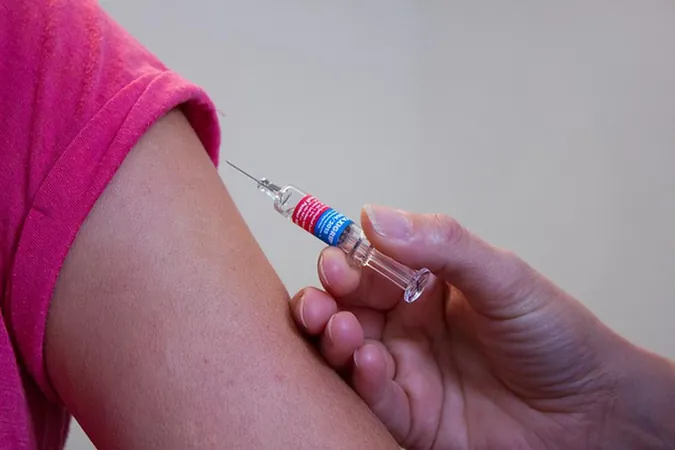
The Truth About Childhood Vaccines: Debunking the Myths Surrounding Immune Overload
2025-01-14
Author: Li
Introduction
In recent years, a widespread misconception has emerged: that American infants are receiving an overwhelming number of vaccines, which purportedly burdens their immune systems and is linked to developmental disorders like autism. This belief has gained traction, famously echoed by influential figures, including former President Donald Trump and vaccine skeptic Robert F. Kennedy Jr.
Misconceptions and Public Figures
Trump, in a call with Mr. Kennedy, remarked on the sheer number of vaccinations it seems infants receive, analogizing the situation to treating a small child with doses intended for larger animals, "It looks like it’s been for a horse, not a 10-pound or 20-pound baby." Despite the abundance of scientific studies that have repeatedly debunked the connection between vaccines and autism, Trump suggested appointing Kennedy to investigate the claims further.
Scientific Insights
However, experts are quick to dismiss the notion that the current vaccination schedule excessively taxes a child's immune system. In fact, modern vaccines are cleaner, more efficient, and contain significantly fewer immune system stimulants than their predecessors from decades past. According to Dr. Yvonne Maldonado, a pediatrician at Stanford University and advisor to the Centers for Disease Control and Prevention (CDC), the immune responses generated by vaccines are minor when compared to the daily exposure children have to environmental pathogens.
The Normal Exposure to Pathogens
Children are constantly surrounded by trillions of bacteria and face encounters with various pathogens, whether from caregivers, playmates, or everyday objects like toys and towels. Dr. Maldonado emphasizes, “That’s just the normal course of growing up," explaining that children naturally develop fevers and immunity from the microorganisms in their environment.
How Vaccines Work
Vaccines function by introducing antigens – pieces of pathogens – into the body, prompting an immune response that prepares the system to recognize and combat serious diseases like measles and polio. The immune systems of infants, although considered 'naive,' are exceptionally adept at learning and adapting to these external threats, especially with the proactive defense vaccines provide.
Vaccination Schedules in the U.S.
In the United States, children typically receive vaccines against approximately a dozen diseases, totaling around 17 doses before the start of kindergarten. Each vaccine shot contains about 10 antigens, which is a stark reduction compared to older vaccines that might contain 300 times as many reactive components. For instance, the smallpox vaccine historically was known to contain up to 200 proteins, and the whooping cough vaccine once contained upwards of 2,000 proteins.
Advancements in Vaccine Technology
Advancements in science have led to purer vaccines, honed over decades of research. The pertussis vaccine, a significant leap forward in the 1990s, replaced its more complex predecessor with a formulation containing merely two to five proteins per dose, ensuring safety and reducing potential adverse reactions.
Debunking Myths about Thimerosal
Despite claims that thimerosal, a mercury-based preservative, contributes to autism, health officials clarify that vaccines like the MMR (measles, mumps, and rubella) never contained thimerosal. Instances where it was used had trace levels akin to that found in a can of tuna. Every vaccine undergoes extensive safety and efficacy testing prior to approval, involving animal studies and lengthy human trials.
Evaluating Vaccine Safety
Critics, including Kennedy, allege biases within federal health agencies regarding vaccine safety, but it's important to note that both the FDA and CDC have independent advisory panels composed of experts across multiple relevant fields, responsible for evaluating vaccine data impartially.
Conclusion
State governments, not the CDC, ultimately determine vaccination requirements for residents. Continuous monitoring of long-term safety reveals no alarming trends from vaccines, with the CDC consistently reporting no signals of harm.
As scientific understanding evolves, one thing remains clear: the overwhelming consensus among medical experts is that vaccines are safe, effective, and crucial for protecting children's health. While the conversation around childhood vaccinations continues to evolve, it's essential to rely on evidence-based information and adhere to recommended vaccination schedules for the well-being of future generations.
 Brasil (PT)
Brasil (PT)
 Canada (EN)
Canada (EN)
 Chile (ES)
Chile (ES)
 Česko (CS)
Česko (CS)
 대한민국 (KO)
대한민국 (KO)
 España (ES)
España (ES)
 France (FR)
France (FR)
 Hong Kong (EN)
Hong Kong (EN)
 Italia (IT)
Italia (IT)
 日本 (JA)
日本 (JA)
 Magyarország (HU)
Magyarország (HU)
 Norge (NO)
Norge (NO)
 Polska (PL)
Polska (PL)
 Schweiz (DE)
Schweiz (DE)
 Singapore (EN)
Singapore (EN)
 Sverige (SV)
Sverige (SV)
 Suomi (FI)
Suomi (FI)
 Türkiye (TR)
Türkiye (TR)
 الإمارات العربية المتحدة (AR)
الإمارات العربية المتحدة (AR)